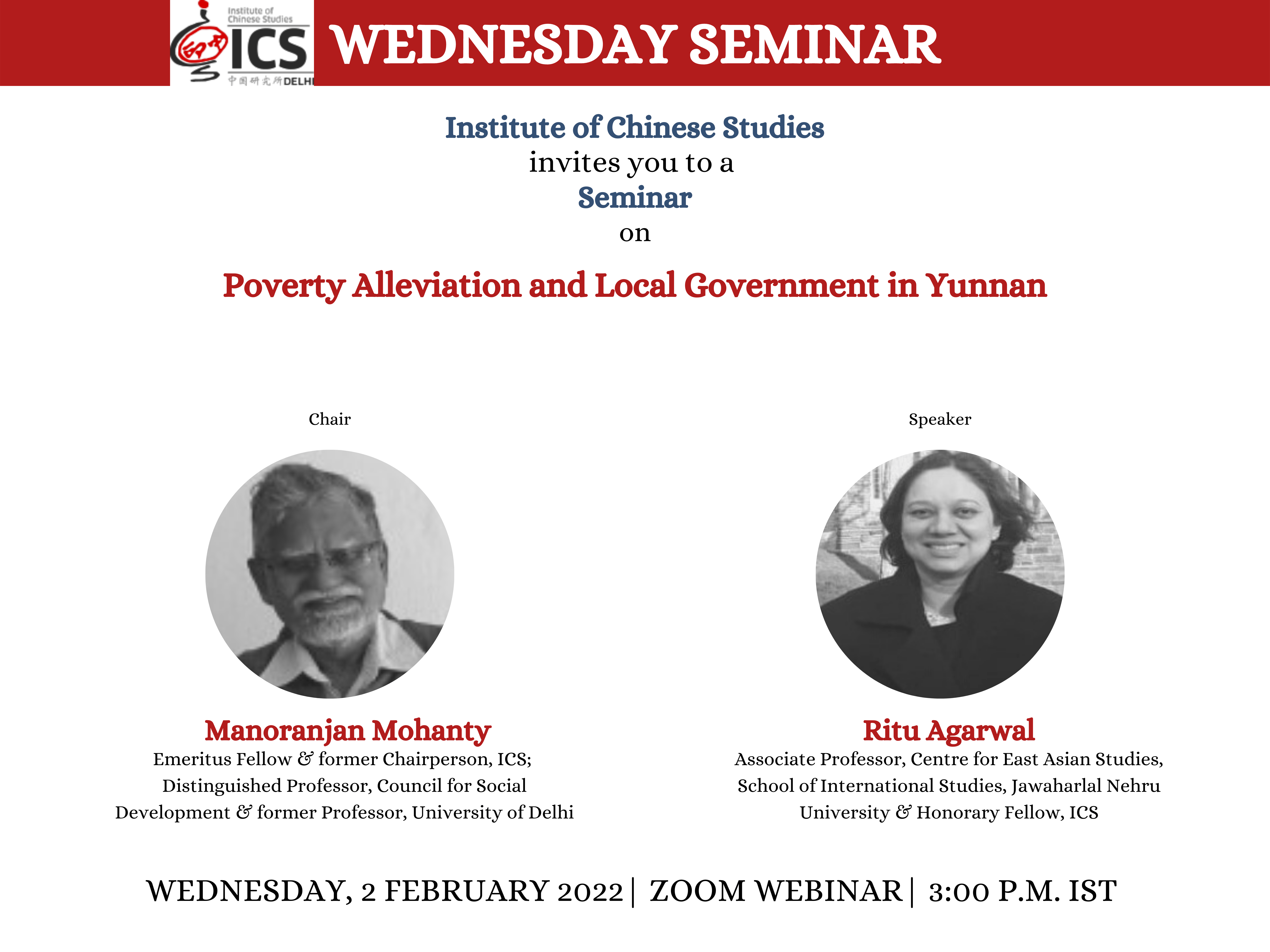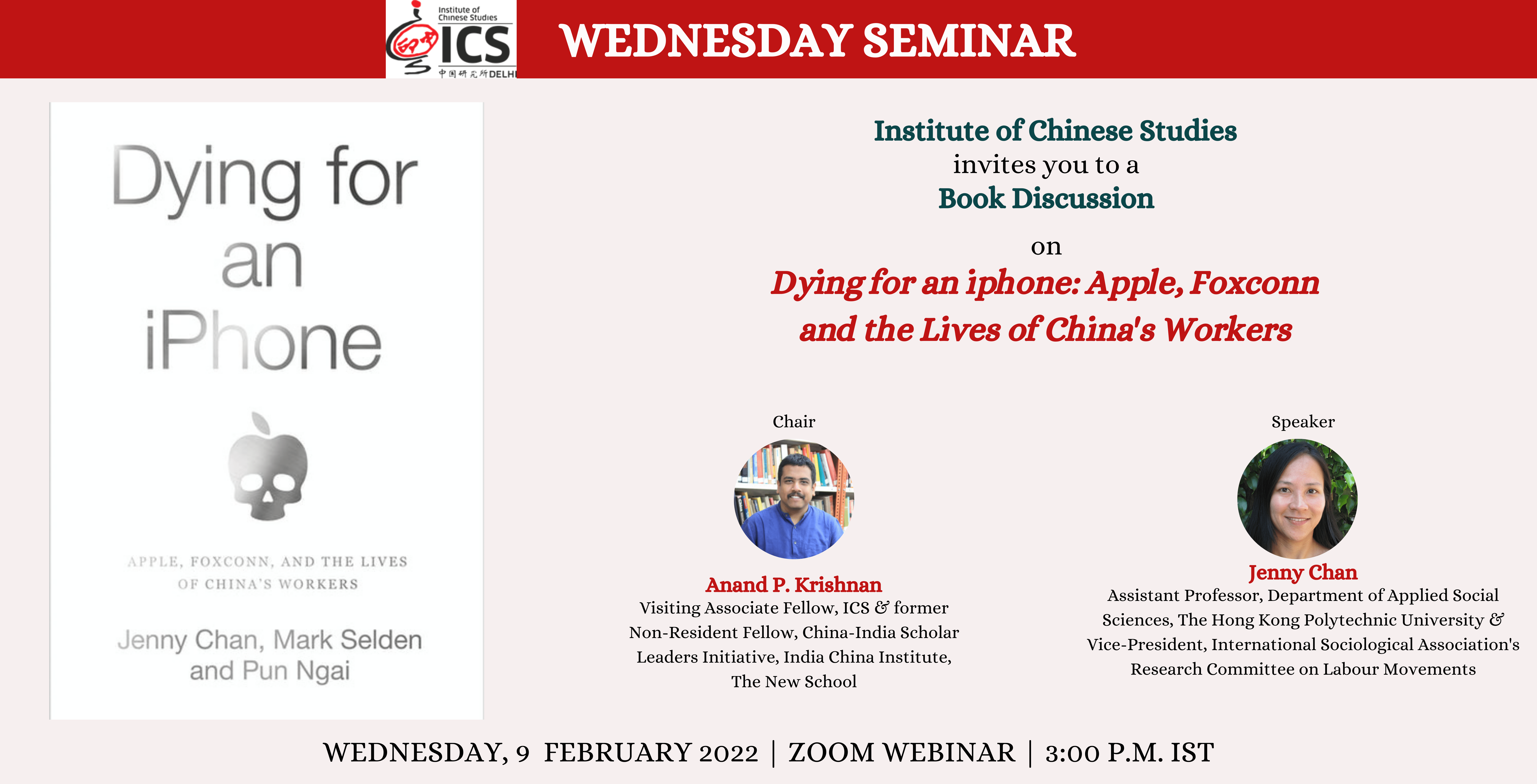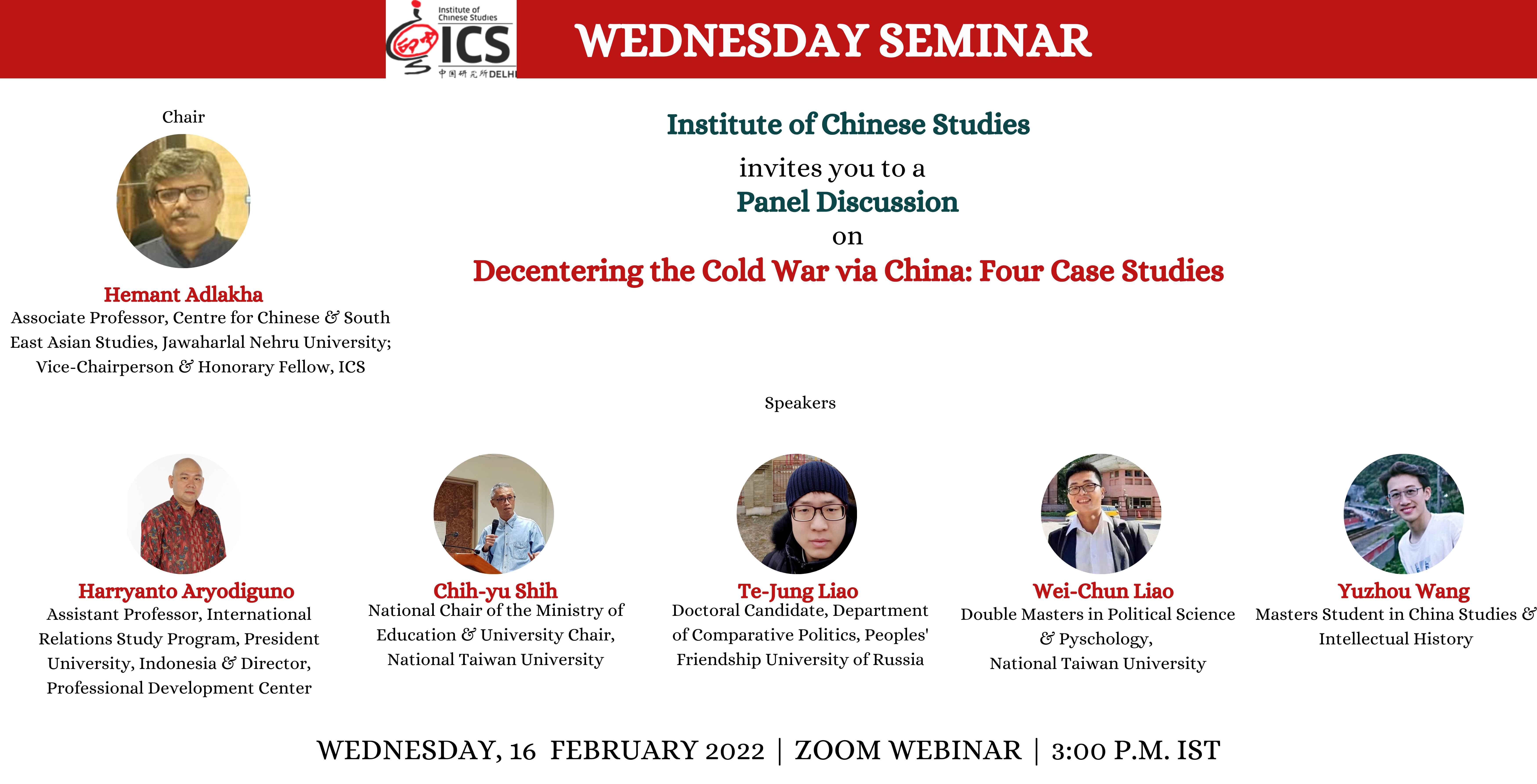 |
| |
| Poverty Alleviation and Local Government in Yunnan |
|
Dr. Ritu Agarwal, Associate Professor, Centre for East Asian Studies, School of International Studies, Jawaharlal Nehru University & Honorary Fellow, Institute of Chinese Studies.
Wednesday Seminar | Zoom Webinar | 2 February 2022
|
| |
|
Poverty in China is often considered to be a rural problem. The official Chinese view is that poverty is concentrated in certain geographical regions and Yunnan province is home to a considerable number of poverty-stricken areas. At the national level, the central government has designated 592 counties as poor counties, 73 of them are located in Yunnan. The new strategy for poverty alleviation devised by Xi Jinping called for a targeted approach in selecting the poor households in different regions of China. Under this strategy, the local government is leveraged to formulate specific policies which are meant to target real poverty. Yunnan has emerged as a key region where targeted poverty alleviation programmes are mandated to and implemented by the local government. The developmental policies of Yunnan have focused on the natural farm production like tobacco and cash crop cultivation to bring substantial increase in the farmers' income in rural minorities areas. However, the benefits of economic growth remained limited to the prefecture and provincial level cities. In this context, this seminar seeked to examine; (a.) what are the determinants identified by the Central government to designate poor population in China and how does these criteria need to be reformulated in the context of Yunnan Provincial experience? (b.) Why did the poor counties not benefit from the macro economic growth in the province? (c.) What has been the poverty alleviation model adopted by the local government in response to Xi Jinping’s drive to bring market entrepreneurship in ethnic minorities regions in Yunnan?
|
| Watch> |
|
|
 |
| |
| Book Discussion: Dying for an Iphone: Apple, Foxconn and the Lives of China’s Workers |
|
Prof. Jenny Chan, Assistant Professor, Department of Applied Social Sciences, The Hong Kong Polytechnic University.
Wednesday Seminar | Zoom Webinar | 9 February 2022
|
| |
|
Between the wave of 18 young worker suicides at Foxconn facilities in 2010 and the outbreak of coronavirus at the end of 2019, Jenny Chan, Mark Selden and Pun Ngai, engaged with Foxconn workers through first-hand interviews as well as their shared poems, songs, open letters, photos and videos, supplemented with meetings with managers and government officials in multiple research trips. Dying for an iPhone (Chan, Selden and Pun 2020) is a study of a new generation of Chinese migrant workers’ hopes, dreams and struggles to survive. The book developed the analytical framework of a “global factory regime” to explain the buyer-supplier power dynamic in transnational manufacturing. Big buyers (such as Apple) and big suppliers (such as Foxconn Technology Group) are highly interdependent in outsourced electronics production, wherein the fluctuation of orders, coupled with tight delivery requirements, shifts production pressure from global tech firms to contract manufacturers. From this critical perspective, the management systems regulating factory floors in China are not only shaped by the authoritarian practices of the domestic nation-state but also by the boom-and-bust purchasing practices of multinational corporations in global supply chains. The dialectics of domination and resistance are interwoven in the life and death struggles of Chinese workers who produce our iPhones. This seminar strived to understand the various facets of this book.
|
| Listen> |
|
|
 |
| |
| Decentering the Cold War via China: Four Case Studies |
|
Prof. Harryanto Aryodiguno, Assistant Professor, International Relations Study Program, President University; Dr. Chih-yu Shih, National Chair of the Ministry of Education & University Chair, National Taiwan University ; Mr. Te-Jung Liao, Doctoral Candidate, Department of Comparative Politics, Peoples’ Friendship University of Russia; Mr. Wei-Chun Liao, Master’s Student, National Taiwan University; Mr. Yuzhou Wang, Master’s Student, National Chengchi University.
Wednesday Seminar | Zoom Webinar |16 February 2022
|
| |
|
East Asia became what it appears to be today during the Cold War, ironically because of the division and rivalry in the alleged region between members of the two Blocs/camps led respectively by the United States and the former Soviet Union. Yet, despite its encompassing pressure for compliance, the two superpowers failed to induce a coherent lens on their enemies or even allies, as their bloc ideologies encountered multiple identities, relations, and agencies at different sites. The panel at this seminar records the intellectual disarray that Cold War studies have rarely revealed in terms of a potentially different meaning for China, contingent upon the relational network in which China was placed. These disconnected narratives on China comprise a harbinger of the implausibility of regionalism in East Asia after the Cold War. Together, the four papers in this seminar, each speaking separately within its own relational setting from the margins of bloc networking, allude to a destabilized China-agenda that the Cold War once set out to monopolize. They explore China from the perspectives of a geographical frontier (Inner Asia), ethnic cleavage (Chinese Indonesian), orthodox culture (Confucian historiography), and securitized non-alignment (India versus China); all embedded in the intellectual sensibilities of their sites and temporalities. Their connection is impossible without an ostensibly existential China, as constructed by the Cold War. Even so, such a connection decentralizes the Cold War but contributes to the continuous marginalization that this panel is determined to reverse.
|
| Read More> |
|
| |
.jpg) |
| |
| Modernisation of the PLA Navy & Response of Regional Navies in the Indo-Pacific |
|
Rear Admiral Michael McDevitt, US Navy (Retd.), Senior Fellow, CNA; Ms. Darshana M. Baruah, Fellow, South Asia Program, Carnegie Endowment for International Peace; Dr. Colin Koh, Research Fellow, S. Rajaratnam School of International Studies, Nanyang Technological University; Captain Kamlesh Kumar Agnihotri, Indian Navy (Retd.), Senior Fellow, National Maritime Foundation.
Wednesday Seminar | Zoom Webinar |23 February 2022
|
| |
|
The People's Liberation Army aspires to be a ‘world class’ military by 2049 in support of China's goal of becoming a global power. Within the PLA, the People's Liberation Army Navy's (PLAN) transformation and expansion is a critical and visible area which needs to be understood. In just three decades, PLAN has grown from a ‘brown water’ to a 'blue-water’ navy with the tag of the “largest navy in the world” to boot. Countries, both within the Indo-Pacific and outside are responding to this development. This seminar delved into current and future developments of the PLAN that are of concern to India. The broad themes of discussion were current and future (2035) capabilities of the PLAN in the Indo-Pacific, responses by other nations in the Indo-Pacific and India's response to PLAN development.
|
| Watch> |
|
|
|
|
|





